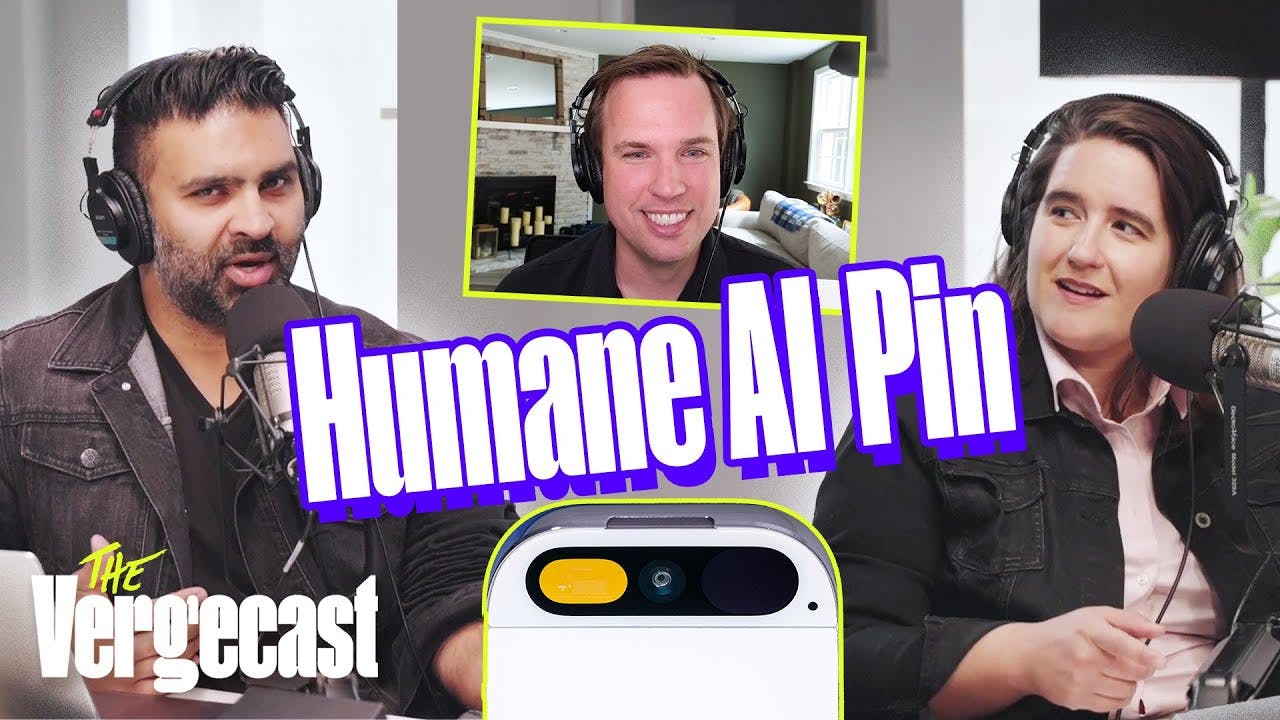The good, the bad, and the Humane AI Pin | The Vergecast
()

Intro (00:00:00)
- The Vergecast discusses the Humane AI Pin and its development over the past year.
- The hosts express skepticism about the claims made in the initial Ted Talk by Imran Chowri, CEO and co-founder of Humane.
- David Pierce reviews the Humane AI Pin.
- The hosts discuss the Vision Pro score and its accuracy.
- Taylor Swift returns to TikTok.
- Gossip about the status of TikTok in Universal Music Group is shared.
- OpenAI and Google face copyright issues.
- Kobo announces new color e-readers.
- Sony releases a new party speaker.
Humane AI Pin review (00:02:06)
- The Humane AI Pin is a wearable device that projects information onto the user's hand.
- The device has several flaws, including overheating, short battery life, and a non-functional display.
- The software, called Cosmos, is an overlapping Venn diagram of AI systems, which creates a complex routing process for tasks.
- The device lacks a clear purpose and fails to deliver on the promise of being a more aware and closer computer.
- The AI Pin's slow performance is due to its reliance on cloud processing and poor connectivity.
Taylor Swift back on TikTok (00:46:24)
- Taylor Swift, who owns her masters and has a distribution deal with Universal Music Group (UMG), was briefly removed from TikTok due to a dispute between UMG and TikTok.
- UMG, led by CEO Sir Lucian Grainge, sought better terms from TikTok, including increased royalties and restrictions on AI usage similar to their YouTube agreement.
- TikTok refused UMG's demands, leading to the removal of UMG artists' music from the platform.
- Other labels benefited from UMG's actions as TikTok improved deals for all labels collectively.
- TikTok's motivations and focus on rapid cultural and technological changes make it less inclined to make deals like YouTube.
- TikTok's increasing commercialization, selling of questionable products, and lack of interest in rules and regulations have led to a decline in its popularity, with many creators quitting or deleting their content.
- Music labels are negotiating with platforms regarding AI usage and control over their content to prevent unauthorized use of their music for training AI models.
- TikTok is predicted to shift away from short, ephemeral videos towards more stable formats like long-form content or "Scrolls."
- The media consumption landscape is undergoing significant changes, with movies, streaming, and social media all experiencing major transitions.
OpenAI gets itself in trouble (01:00:07)
- OpenAI's Whisper system, trained on over a million hours of transcribed YouTube videos, sparked controversy due to potential violations of YouTube's terms of service.
- Google, the owner of YouTube, has a history of expanding copyright boundaries and has faced lawsuits related to copyright infringement.
- The situation involves legal conflicts between OpenAI, Google, and the New York Times, raising concerns about motivations and the devaluation of creative works for financial gain.
- Tech giants are aggressively acquiring data, even considering buying publishers to avoid copyright issues.
- Companies prioritize creating innovative content and then seek ways to replicate it cheaply through machines, potentially viewing copyright infringement as an acceptable cost.
- YouTube creators may pressure Google to take legal action against OpenAI for scraping YouTube content, setting a precedent for copyright infringement in training AI models on publicly available data.
- OpenAI's interpretation of "publicly available data" is crucial in determining the legality of their actions, with precedents leaning towards the legality of scraping websites.
- Google employs technical and legal measures to prevent unauthorized use of copyrighted content on YouTube.
- The increasing cost of training data poses challenges for companies developing AI models, leading to the exploration of synthetic data, which can cause issues like hallucinations.
- Synthetic data may become the primary training data source due to copyright concerns and the high cost of real data, potentially transforming the internet as we know it.
- The Vergecast introduced the concept of the Humane AI Pin, an AI ethics certification displayed on websites to indicate ethical AI usage, awarded after an independent audit of the AI's development and use.
Lightning Round (01:14:26)
- Kobo released new color e-readers using the same technology as Onyx books, potentially competing with Amazon's color Kindle.
- The Motion Picture Association (MPA) is lobbying Congress to reinstate site blocking as a means to combat piracy, despite the success of accessible streaming platforms in reducing piracy in the past.
- Meta's Messenger app introduced an update that allows users to send higher-quality photos without compromising their original resolution.
- Sony is introducing a new brand called "UL Power Sound" for its party speaker products, replacing the Extra Bass branding. The flagship product, the UL Tower 10, is a 64lb party speaker with 34 LED light zones, a touchscreen, and a wireless microphone for karaoke.
- The Vergecast team discussed the "Humane AI Pin," a wearable device that displays the wearer's emotional state to increase empathy and understanding among people. However, concerns were raised about its privacy implications and potential to cause social anxiety.